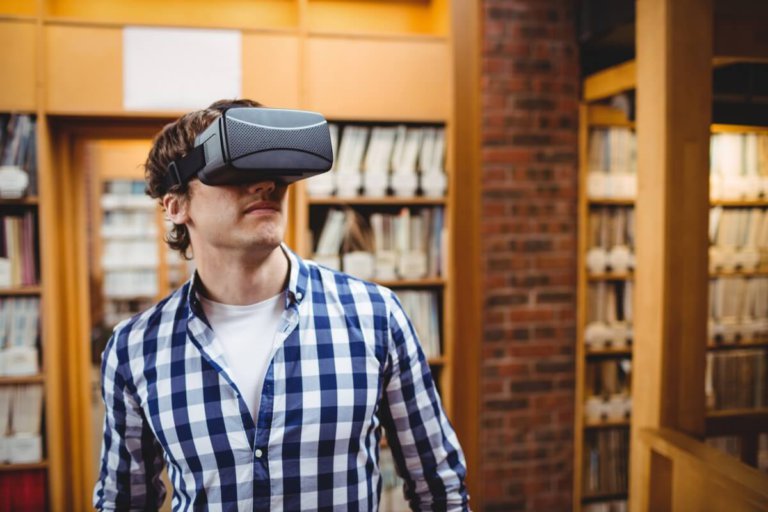
Technology is advancing at lightning speed, which means both our personal and professional lives are ripe for disruption.
Newer waves of technology such as virtual reality (VR) have a wide range of uses. VR involves wearing a headset that creates a digital environment with lifelike reality; it controls your senses, helping you to believe you’re in a different world. It is currently being used across a variety of industries, from education to business, in white collar settings to the factory floor.
As VR becomes mainstream, this translates to tectonic shifts in how we live and work. Waves of VR products have been entering the market, but there’s still room for the technology to grow in sophistication. This calls for professionals who can take this technology to the next level.
As such, expertise in computer science has never been more important. The US Bureau of Labor and Statistics notes that employment of computer and information research scientists is projected to grow 16 percent from 2018 to 2028, much faster than the average for all occupations. Computer scientists are poised to enjoy excellent job prospects as many companies report difficulties in finding highly skilled workers.

The University of Oulu has been at the forefront of innovation through its education and research initiatives. Graduates with a computer science or a related undergraduate degree looking to develop an expertise in the field can consider pursuing the university’s MSc in Computer Science and Engineering (CSE) programme.
An immersive learning experience
The University of Oulu’s MSc in CSE programme is a two-year, research-oriented degree. It concentrates on intelligent digital solutions to real world problems. Students will not only study in a cutting-edge research environment, but combine both theoretical and practical approaches to learning. They can choose from three specialisations: Applied Computing, AI and Computer Engineering.
Steven LaValle, a Professor of Computer Science and Engineering, in particular, robotics and VR, at the University of Oulu, said the programme is unique as students can supplement their studies with other subjects. The programme produces students who are graduate-ready as courses are closely related to industry demands. A project-based approach is taken in most of the courses, and students are actively encouraged to take part in research activities.
In the area of VR, to help students put theory into practice, MSc CSE students develop and evaluate experiences by working in the lab with the actual devices. “Through trial and error, they learn and apply a fundamental understanding of human vision in combination with a deep understanding of how the technological components work,” said LaValle.
“We believe that VR and related wearable technologies will one day radically transform the way we live in many settings, including work, school, recreation, travel, health care and family interaction. Systems are rapidly advancing, making this an ideal time to learn the fundamentals needed to contribute to these advances.”
He added that it is critical to understand perception engineering, which is the design, development and delivery of perceptual experiences that are beyond our ordinary life encounters.
“This involves a mixture of computing hardware, software, sensors, optical engineering, perceptual psychology, and neuroscience. Thus, it is highly interdisciplinary,” he said.
Exploring new frontiers
VR technology holds a wealth of untapped potential, making it a promising field of study.
LaValle said most large companies are currently exploring how VR and related technologies can enhance or disrupt their business. Meanwhile, there are also significant opportunities in startup companies that are building content for consumers or other companies, he said.
The MSc CSE programme equips students with an arsenal of skills.
“Through the programme, students work collaboratively in groups; their success depends largely on their ability to succeed in this way, thereby contributing to their soft skills. Their hard skills are developed through both deep understanding of the technical concepts and through extensive project development experience,” he said.

University of Oulu
LaValle said graduates will be equipped to work in a variety of positions offered by research institutes and companies mainly operating in the field of information and communications technology (ICT). They are likely to be employed in research and development related positions, but also management positions and entrepreneurship fit into the profile. The work is often international, he said.
All-encompassing
The University of Oulu’s prowess in the field is undeniable. For instance, in a competition arranged by the DIHNET.EU, the university was selected to set up the European AI Digital Innovation Hub Network. This network project builds operating model and tools for future DIH networks. Their DIH was established in 2016 and has 300 ICT member companies; it collaborates closely with other DIH around Europe.
It’s clear that the University of Oulu is carving its name as a leader in the field. In addition to this, its strategic location in Oulu – the technological heart of Finland – and its ranking in the top three percent of the 17,000 universities worldwide – make it a highly attractive place to study.
Follow the University of Oulu on Facebook, Twitter, YouTube, Instagram and LinkedIn
Liked this? Then you’ll love…
Innovative teaching approaches: Virtual reality in the classroom
Why you should pursue an IT and engineering postgraduate degree at the University of Oulu







